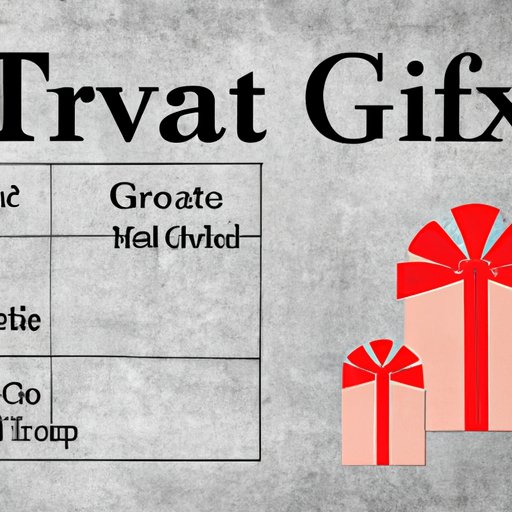
How to Avoid Gift Tax: A Comprehensive Guide
Gift-giving is a way to show our loved ones how much we care about them. However, when it comes to giving large sums of money or valuable assets, tax concerns can arise. The federal government imposes a tax on gifts that exceed certain amounts, known as the gift tax. The tax can add up quickly, but fortunately, there are ways to legally avoid it. In this article, we’ll explore these strategies and offer tips for maximizing their benefits.
Utilizing the Annual Gift Tax Exclusion
The annual gift tax exclusion allows taxpayers to give up to a certain amount to an unlimited number of individuals per year without incurring gift tax. For 2021, the exclusion is $15,000 per recipient. This means that if you give up to $15,000 per year to each of your children and their spouses, you can give a total of $60,000 without paying gift tax.
To maximize the benefit of the annual exclusion, consider spreading your gifts throughout the year. For example, if you give your child $15,000 on December 31st and another $15,000 on January 1st, you’ll exceed the annual exclusion and incur gift tax. Instead, stagger the gifts throughout the year to stay within the limit.
Utilizing the Lifetime Gift Tax Exemption
In addition to the annual exclusion, taxpayers have a lifetime exemption from gift tax. For 2021, the exemption amount is $11.7 million per person. This means that if you give gifts in excess of the annual exclusion, you can use your lifetime exemption to avoid gift tax on the excess amount.
However, it’s important to be strategic about using your lifetime exemption. You may want to save it for larger gifts or to pass on wealth to future generations. Using your lifetime exemption too soon could have unintended consequences. Additionally, keep in mind that the exemption amount may change in the future as tax laws are revised.
Paying for Educational and Medical Expenses
Qualified educational and medical expenses are exempt from gift tax. This means that if you pay tuition, medical bills, or health insurance premiums directly to the institution or provider, the payments won’t be considered gifts for tax purposes.
To make the most of this exception, keep detailed records of the payments you make. Be sure to pay the institution or provider directly rather than giving money to the recipient to pay the bills themselves.
Making Gifts to Charity
Giving to qualified charitable organizations is an excellent way to support a cause you care about while also minimizing gift tax liability. Gifts made to 501(c)(3) organizations are tax-deductible, meaning they can reduce your income tax liability.
To maximize the tax benefits of charitable giving, consider donating appreciated assets such as stocks or real estate. This allows you to avoid paying capital gains tax on the appreciation while also benefiting the charity and reducing your gift tax liability.
Choosing the Right Ownership Structure
The way property is owned can impact gift tax liability. For example, if you own property jointly with another person, each person is considered to have made a gift to the other person equal to half the value of the property. This can trigger gift tax if the value exceeds the annual exclusion or lifetime exemption.
Consider structuring ownership of property in a way that minimizes gift tax consequences. For example, if you’re married, consider owning property as tenants by the entirety, which allows each spouse to own the entire property without triggering gift tax.
Timing Gift-Giving Strategically
Timing gift-giving strategically can help reduce gift tax liability. For example, if you give a gift late in the year, it may make more sense to wait until the beginning of the next year to give another gift rather than exceeding the annual exclusion and incurring gift tax.
Additionally, giving gifts early in the year can help maximize the benefits of the annual exclusion. This is because the exclusion resets at the beginning of each year, so giving a gift early in the year allows you to give another gift later in the year up to the annual exclusion amount.
Conclusion
Avoiding gift tax requires careful planning and consideration of tax laws. By utilizing the strategies outlined in this article, you can give generously to your loved ones while minimizing tax liability. Remember to keep detailed records of your gifts and consult with a tax professional for more personalized advice.
For more information on gift tax and tax planning, check out the IRS website or consult with a tax professional in your area.




